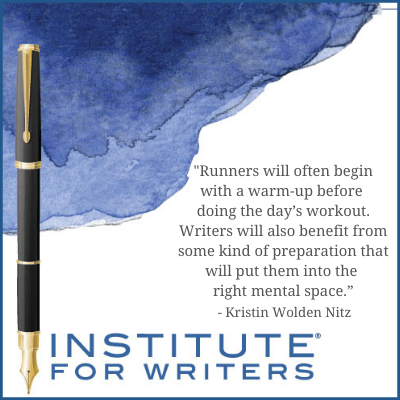
Ideas in Day-to-Day Life and Story Writing
Inspiration and ideas can strike at any time. Susan Ludwig details why and how daily life can be our biggest source of inspiration for writers.

We teach our students how to write and get published!
View our Course Catalog >
Countless websites and articles are dedicated to giving people a plan for how to get off the couch and work toward the goal of successfully completing a 5k. Since everyone starts at a different point in their journey, some people might have to spend weeks walking before they’re ready to run for their first minute. But in the end, those who persevere will cross the finish line.
Whether you’ve been away from your writing for a while or just haven’t been making as much progress on your novel as you’d like, here are some things to consider as you recommit to your characters. Instead of building strength, endurance, and flexibility, you’ll concentrate on drafting, editing, and studying your writing craft with targeted sessions that fit your week. If you persevere, you’ll have a complete manuscript that’s ready to go out on submission.
While you don’t need a doctor’s permission to get started on an ambitious writing program, you still want to stay healthy and avoid injuries. While new runners should have a specialist help them pick out a proper pair of training shoes that address their specific needs, writers should review their computers’ ergonomic set-up and recommendations for proper posture to avoid the pain associated with repetitive stress.

While it’s possible to put in the miles with nothing more than a proper pair of shoes and some comfortable clothes, some runners choose to invest in moisture-wicking gear and watches that can keep track of every possible stat. Similar choices can be made in your writing life. You can scribble away in a spiral-bound notebook with a ballpoint pen before transferring your story to an aging laptop, or you can invest in some smooth gel pens and attractive books of blank pages. Just about any computer will do for word processing these days. (When you do finally need an upgrade as I recently did, consider a backlit keyboard for dim locations.)
In a Couch to 5k, participants only run three days a week with at least one mandatory day of rest between every workout. (They are free to do yoga or some kind of strength training on those off days.) Writers, on the other hand, can sit down with their stories every day right from the start. In fact, if you plan to get up early, I’d actually recommend it. Then you don’t have to worry about setting your alarm clock every night.
Others might benefit from writing every other day. On those off days, you can plan to catch up on chores, do research, or study your craft. Why not check out a book on plotting by an industry professional? Or you could reread your favorite writers. It can be truly delightful and downright illuminating to see how they set scenes, establish characters, create emotion, and slip vital clues into the narrative.
Runners will often begin with a warm-up before doing the day’s workout. Writers will also benefit from some kind of preparation that will put them into the right mental space. For some people, stopping by the kitchen for some kind of a beverage helps. Others like scribbling in a notebook about their day to prime the pump. Some even follow The Artist’s Way by Julia Cameron and write three pages of longhand every morning. (I’ve always been too anxious to spend time with my characters to even contemplate such an approach.)
Avoid social media! You might see something that will make you want to check in for an update instead of focusing on your work. Catch up with your characters instead and review the last few pages to see what they’ve been up to. That can also give you momentum once you’re ready to start.
You might already have a favorite place and way to write just as runners have their favorite trails. All the same, it can be helpful to mix up your routine in order to build up different creative muscles. You might try some kind of aerobic writing in order to shut off that pesky internal editor. No backspacing allowed! You can only move forward. On another day you can labor over those troublesome transitions so that the writing appears effortless.
Once you do start scribbling or typing, here’s one last thing to think about. Most Couch to 5k programs focus on the time spent running rather than the mileage. One of the reasons for this could be that the runners will alternate between jogging and walking in the beginning for set amounts of time. But anyone who runs will tell you that your times will get longer on a hilly course. If you’re writing a challenging scene, it might feel like you haven’t made much progress at all. Sure, you can keep track of the change in word count and celebrate days with a high total, but you will achieve your goal for the day—and eventually your goal of a submittable manuscript—if you put in the time.
Kristin Wolden Nitz has been an instructor with the Institute since 2005. Kirkus described her YA mystery, SUSPECT, as “Intriguing, suspenseful fun.” Many librarians agreed. SUSPECT was a YALSA Best Fiction for Young Adults Nominee as well as a “best book for Language Arts” from the Society of School Librarians International. Kristin’s middle grade contemporary fantasy, SAVING THE GRIFFIN was nominated for children’s choice awards in Kentucky and Georgia. Kristin is a client of Erin Murphy. She lives with her husband in Southwest Michigan.

Inspiration and ideas can strike at any time. Susan Ludwig details why and how daily life can be our biggest source of inspiration for writers.

Should you enter a writing contest or not? If your writing rises to the top, you just might win a prize upwards of thousands of dollars if you’re lucky.

To many, writing is revision, and most writers revise their manuscripts numerous times before they’ve shaped it into the best version that it can be.
1000 N. West Street #1200, Wilmington, DE 19801
© 2024 Direct Learning Systems, Inc. All rights reserved.

1000 N. West Street #1200, Wilmington, DE 19801
© 2025 Direct Learning Systems, Inc. All rights reserved.

1000 N. West Street #1200, Wilmington, DE 19801
©2025 Direct Learning Systems, Inc. All rights reserved. Privacy Policy.
2 Comments